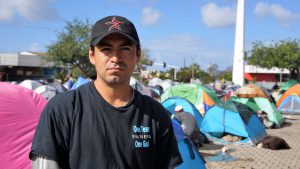Juan Barraza: Life After Deportation

After living in San Diego county for 27 years, Juan Barraza, now deported, has faced tough times. Just this past Saturday, rain flooded the five-square-foot tent he’s been living in at a Tijuana public park.
“Well, at least I wasn’t getting wet the whole time. Back in December, I was still sleeping on the street,” said the former resident of Escondido, Vista, and Oceanside.
On Sunday, he took advantage of a moment when the sky cleared to put out cardboard to dry so he could use it as a makeshift mattress on top of a wood plank elevated on bricks so he can keep dry during the next rains.
“The irony of it is, in Escondido I used to work in construction, but here I have no material nor permission to build anything,” he said.
Juan was brought by his parents to North County when he was just three years old. He was a legal resident and considered himself practically American. He attended public schools until the 11th grade, when he was expelled from Escondido High School for discipline issues. He enrolled in some other schools after that, but was never able to finish high school, so he just got a job.
Two years ago, he got into an argument with his girlfriend over money he spent to buy marijuana, it escalated, and he got physical with her. She called the police, and after his arrest he was turned over to Immigration and Customs Enforcement (ICE) and was deported to Tijuana.
“My life changed very suddenly, in a matter of a few days, and unfortunately it changed just before I would have had some protection,” he explained, referring to SB54, which took effect months later and under which he would have faced domestic violence charges, but without deportation, now that marijuana use by adults is legal in California.
When he first got to Tijuana, he spoke much better English than Spanish, and he soon realized that having lived in San Diego did not open any doors or help him in any way whatsoever.
He spent a week at a shelter, but had to leave because he had reached the maximum number of days allowed. Fortunately, however, he was at least able to call his mom while he was there so she could bring him some clothes, a little bit of money, and a disposable cell phone.
Since leaving, it has been difficult to get any help from San Diego, and Juan Barraza has had to move from place to place.
Although he is not a drug user, he was able to get a job at a rehab center in exchange for a place to sleep and something to eat, but said he noticed that they were never going to help him move forward at that place. They wanted him to stay in the same place, so as soon as he could, he left for the streets.
He finds jobs as a day worker from time to time, doing construction or plumbing, painting, but they are few and far between and, since he still does not have documents as a Mexican, many won’t give him a job, and sometimes when they do, they end up not paying him.
All told, he has been at six temporary shelters, mostly for just a few days each.
“I can’t complain, because in one way or another, they have helped me here in Tijuana.” For instance, when the warm summer months ended, and he asked Jose Maria Garcia at the Juventud 2000 camp shelter if he could stay a while because it was starting to get cold out.
He was given a tent, and he joined about 200 other people in similar circumstances at the park, located less than 500 feet from the San Diego-Tijuana border fence. It is one of the places where he has lived the longest.
For now, Juan is getting medical care at Seguro Popular, a public healthcare system for the uninsured whose only requisite is that you reside in Tijuana.
His dream now is to have his documents as a Mexican citizen so he can take his commercial driver’s license exam.
“I am 32, and I can still make a career out of something like that,” he said. “I would like that.”
Juan has barely a few clothes and even fewer other belongings; everything he owns fits into a single backpack. Along the road, he has left some memories and expectations. “I would have liked for some of my friends to come see me once in a while, but I don’t blame them. It’s not easy to get around in Tijuana if you don’t know the city, and even I don’t know where I will be from one day to the next.”
What he does yearn for are some of the things he liked, like going to have burritos or flautas at Pancho’s Mexican Grill any time he had the chance. “Oh, man, they make them so good, and the salsas are amazing.”
He confided that he sees little chance of returning to California, so he would rather make plans to get off the streets and the park someday, get an apartment, buy some furniture. “I also want to improve my Spanish. I still find it hard to tell a woman how I feel about her.”





